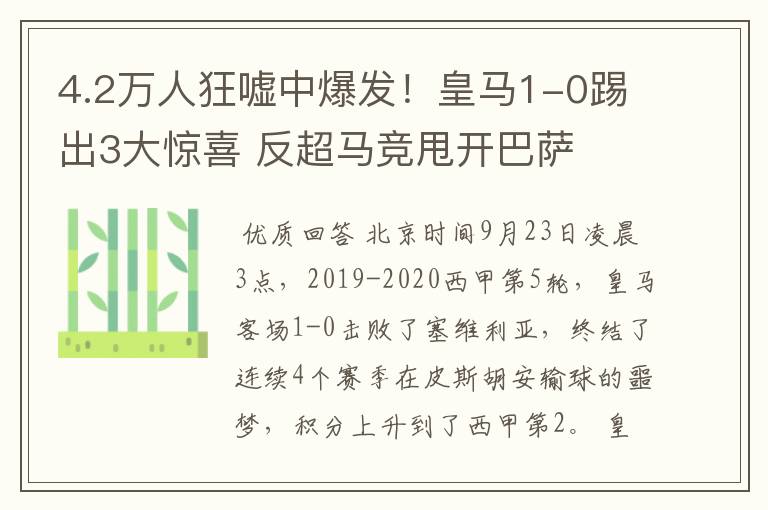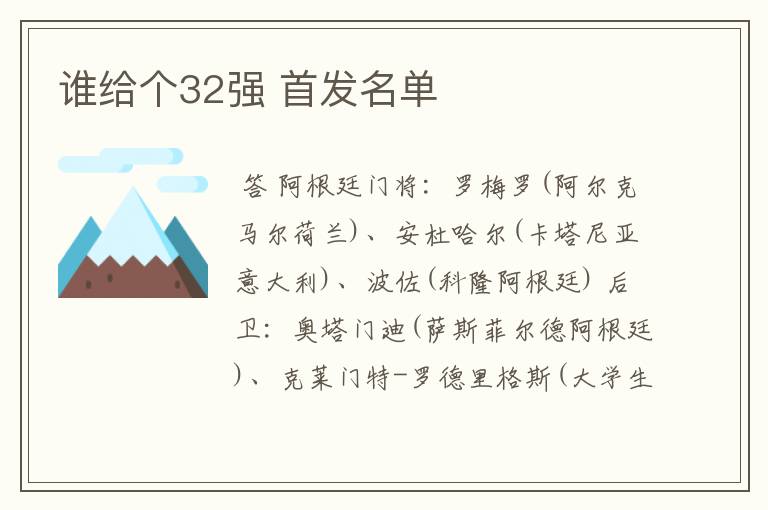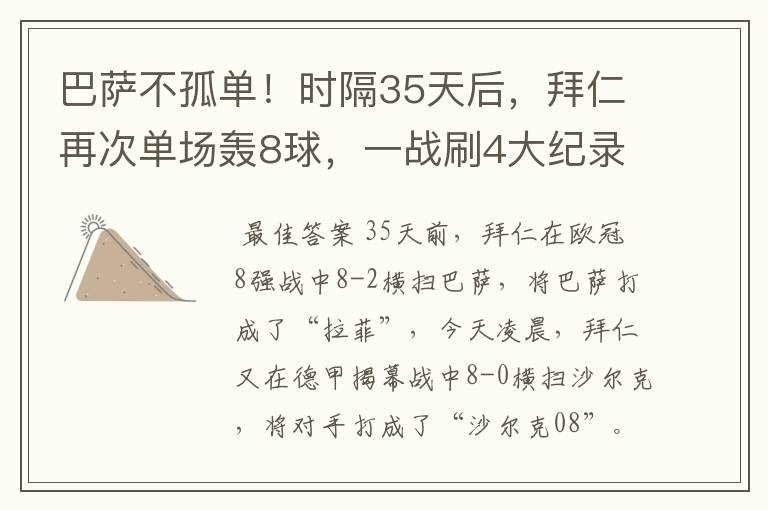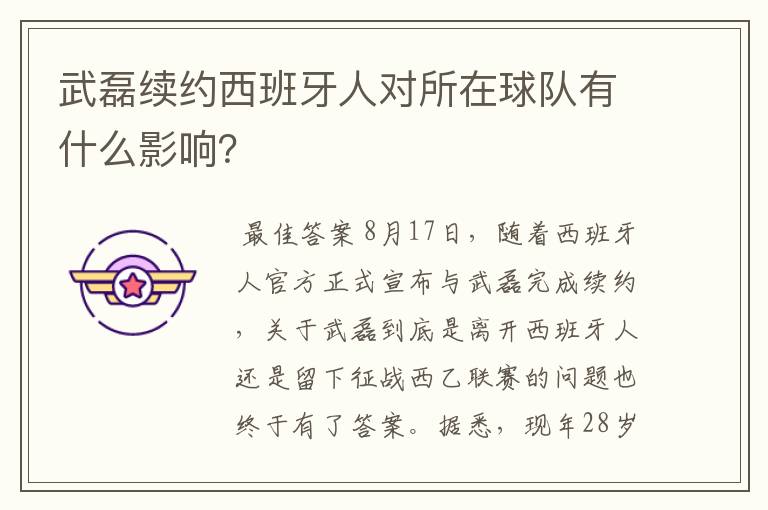locelso阿根廷球员
今天运困体育就给我们广大朋友来聊聊德甲阿根廷球员阿拉里奥,希望能帮助到您找到想要的答案。
LUCAS 是什么意思?
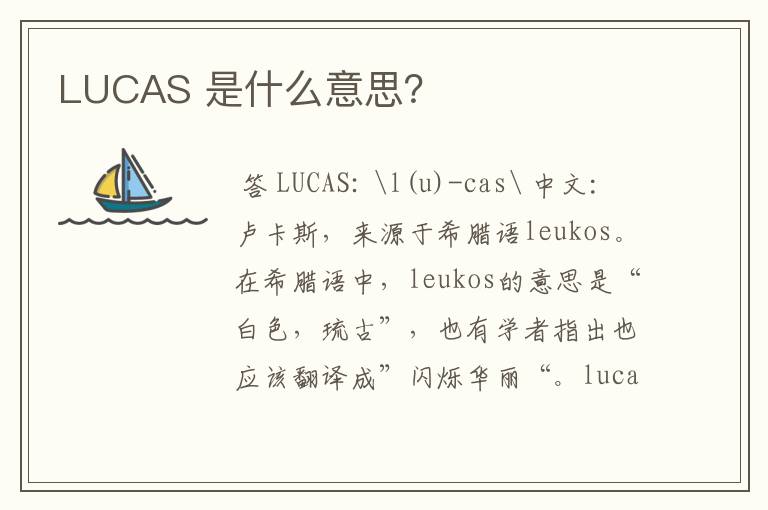
答LUCAS: l(u)-cas 中文:卢卡斯,来源于希腊语"leukos"。在希腊语中,"leukos"的意思是“白色,琉古”,也有学者指出也应该翻译成”闪烁华丽“。"lucas"现多用于西方男性名字和姓氏。
此外在古希腊的语境里,黑和白“leukos”是有性别倾向的。古希腊称赞女性时,会说圆臂如雪(肤质跟家境一样好);但如果你说一个希腊男人白净,就等于说他娘气无用。所以其时一个男人如果常年闯荡四海,是条风雨不避的硬汉,那么说他“肤黑”会是种贴切的赞赏。
LUCAS也来源于拉丁语中的"lux","lux"是个拉丁根,翻译成“光”。
扩展资料
用lucas当做姓和名字的人有,乔治·卢卡斯(George Lucas),配图中右边人物,《星球大战》系列电影的导演,谢振轩(Lucas Tse),谢霆锋和张柏芝的儿子等等。
造句:
1、That is Lucas. He is so cute and sweet!那是卢卡斯,他真的太可爱和体贴了。
2、Gees, I really had a rough day but Lucas was there to cheer me up. What an incredible guy.天,我真的过了糟糕的一天,但是卢卡斯一直在那里鼓励我,真是一个很棒的人。
3、Lucas is the sweetest guy you will ever meet.卢卡斯会是你见过所有人中最贴心的一个。
足球相关的翻译1
答足球文化F ootball文化指的是文化方面围绕游戏足球协会。
在许多国家,足球已经成为根深蒂固的国家文化和地区的生活可能会围绕着它。许多国家已每日足球报纸,以及
足球杂志。足球运动员,特别是在最高级别的比赛中,已经成为榜样的人。游戏已经成为glamourised ,许多儿童在游戏和执业渴望的财富展示了足球的顶端。
游戏
'德比'
主要文章:同城德比
德比的比赛,或符合两个邻国之间的竞争对手俱乐部,往往是激烈的竞争。有时有根本的政治和教派紧张关系。这个词经常适用的两支球队之间的比赛从同一城市或地区。然而,它有时是用来指大俱乐部之间的比赛来自同一国家-这些可以在重大足球对抗的文章
食物
在英国,参加足球比赛也与消费的“传统足球的食物” 。牛排和肾脏馅饼,肉和马铃薯馅饼是主食店体育场。有些人认为足球场上的唯一地方的人要消耗Bovril -和,异常,伦敦的独家格劳乔俱乐部。现在销售的食品,让乐迷可以引起高收入者的俱乐部,以及一些俱乐部做出努力,以改善他们的服务和多样化的传统食品。 [ 2 ]在巴西, sanduíche日calabresa (胡椒三明治)是一种流行的餐周围地区之后的比赛场馆。在Mineirão体育场, feijão tropeiro ,一个典型的菜来自Minas Gerais ,也很常见。在德国,很多球迷吃香肠和喝啤酒。在阿根廷, choripán (三明治与烤香肠的面包)和烤汉堡包普遍服务场馆
匹配方案
纽约市的比赛方案。
匹配方案是出售场馆内外之前,有时期间,火柴。在最简单的形式,他们提供的基本资料队,球员和比赛官员。俱乐部通常会产生较大的多页的方案与功能,如评论经理和队长,采访球员,前球员和幕后工作人员,有关票务安排,为即将举行的比赛,比赛的详细清单和审查小组的赛季目前,竞赛,网页初中球迷,和详细的功能上的反对。方案的某些场次的比赛是收藏的物品,并能获取金钱拍卖。
梅西的英文简介
答Lionel Messi
From Wikipedia, the free encyclopedia
"Messi" redirects here. For the biopic, see Messi (film).
This name uses Spanish naming customs: the first or paternal family name is Messi and the second or maternal family name is Cuccittini.
Lionel Messi
Messi playing for Argentina in the 2014 FIFA World Cup Final
Personal information
Full name
Lionel Andrés Messi Cuccittini[1]
Date of birth
24 June 1987 (age 27)
Place of birth
Rosario, Argentina
Height
1.70 m (5 ft 7 in)[2]
Playing position
Forward
Club information
Current team
Barcelona
Number
10
Youth career
1995–2000
Newell's Old Boys
2000–2003
Barcelona
Senior career*
Years
Team
Apps†
(Gls)†
2003–2004
Barcelona C
10
(5)
2004–2005
Barcelona B
22
(6)
2004–
Barcelona
315
(286)
National team‡
2004–2005
Argentina U20
18
(14)
2007–2008
Argentina U23
5
(2)
2005–
Argentina
97
(45)
Honours[show]
* Senior club appearances and goals counted for the domestic league only and correct as of 23 May 2015.
† Appearances (Goals).
‡ National team caps and goals correct as of 12 November 2014
Lionel Andrés "Leo" Messi Cuccittini (Spanish pronunciation: [ljoˈnel anˈdɾes ˈmesi] ( listen); born 24 June 1987) is an Argentine professional footballer who plays for Spanish club FC Barcelona and the Argentina national team. He is a forward and serves as captain for Argentina.
By the age of 21, Messi had received Ballon d'Or and FIFA World Player of the Year nominations. The following year, in 2009, he won his first Ballon d'Or and FIFA World Player of the Year awards. He followed this up by winning the inaugural FIFA Ballon d'Or in 2010, and then again in 2011 and 2012. He also won the 2010–11 UEFA Best Player in Europe Award. At the age of 24, Messi became Barcelona's all-time top scorer
in all official club competitions. In September 2014 he scored his
400th senior career goal for club and country aged just 27. In November
2014, Messi became the all-time top scorer in La Liga, and the all-time leading goalscorer in the UEFA Champions League.
Often considered the best player in the world and rated by some in the sport as the greatest of all time,[3][4][5][6][7][8] Messi is the first football player in history to win four FIFA/Ballons d'Or, all of which he won consecutively, and the first to win three European Golden Shoe awards. With Barcelona, Messi has won seven La Ligas, three Copas del Rey, six Supercopas de España, three UEFA Champions Leagues, two UEFA Super Cups and two FIFA Club World Cups.
Messi is the only player to top-score in four consecutive Champions League seasons, and also holds the record for the most hat-tricks scored in the competition
with five. In March 2012, he made Champions League history by becoming
the first player to score five goals in one match. In the 2011–12
season, Messi set the European record for most goals scored in a season with 73 goals, set the goalscoring record in a single La Liga season with 50 goals, and became the second player ever to score in six different official competitions in one season after Pedro.[9]
In February 2013 he scored his 300th Barcelona goal. On 30 March 2013,
Messi scored in his 19th consecutive La Liga game, becoming the first
footballer in history to net in consecutive matches against every team
in a professional football league. He extended his record scoring streak
to 21 consecutive league matches. In March 2014, with a hat-trick
against Real Madrid, Messi became the player with the most goals and most hat-tricks in the history of El Clásico. In October 2014, Messi, aged 27, became the youngest player to score 250 goals in La Liga. In November 2014, Messi scored a hat-trick against Sevilla to reach 253 La Liga goals, becoming the all-time top scorer in La Liga. In May 2015, he scored his 77th Champions League goal to become its all-time leading scorer.
Messi helped Argentina win the 2005 FIFA U-20 World Cup, finishing as both the best player and the top scorer (with six goals). In 2006, he became the youngest Argentine to play and score in the FIFA World Cup, and won a runners-up medal at the Copa América in 2007, in which he was named young player of the tournament. In 2008, he won an Olympic Gold Medal with the Argentina Olympic football team. At the 2014 World Cup, he led Argentina to the final, winning four consecutive Man of the Match awards in the process, and received the Golden Ball award as the best player of the tournament. In 2013, SportsPro rated him the second-most marketable athlete in the world.[10] His playing style and stature have drawn comparisons to compatriot Diego Maradona, who himself declared Messi his "successor".[11]
今天的内容先分享到这里了,读完本文《locelso阿根廷球员》之后,是否是您想找的答案呢?想要了解更多,敬请关注www.zuqiumeng.cn,您的关注是给小编最大的鼓励。
本文来自网络,不代表本站立场,转载请注明出处:https://www.zuqiumeng.cn/wenda/853394.html
